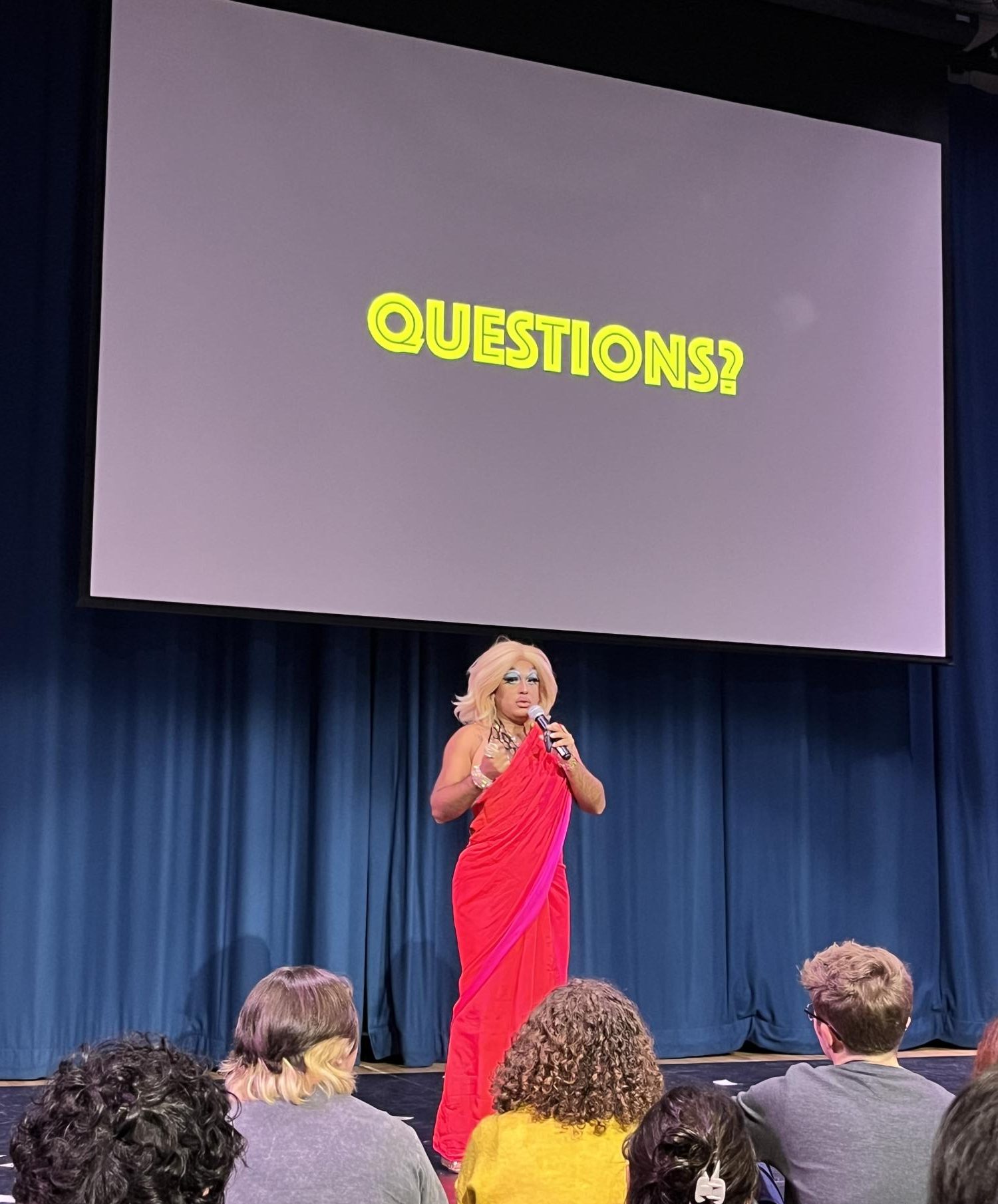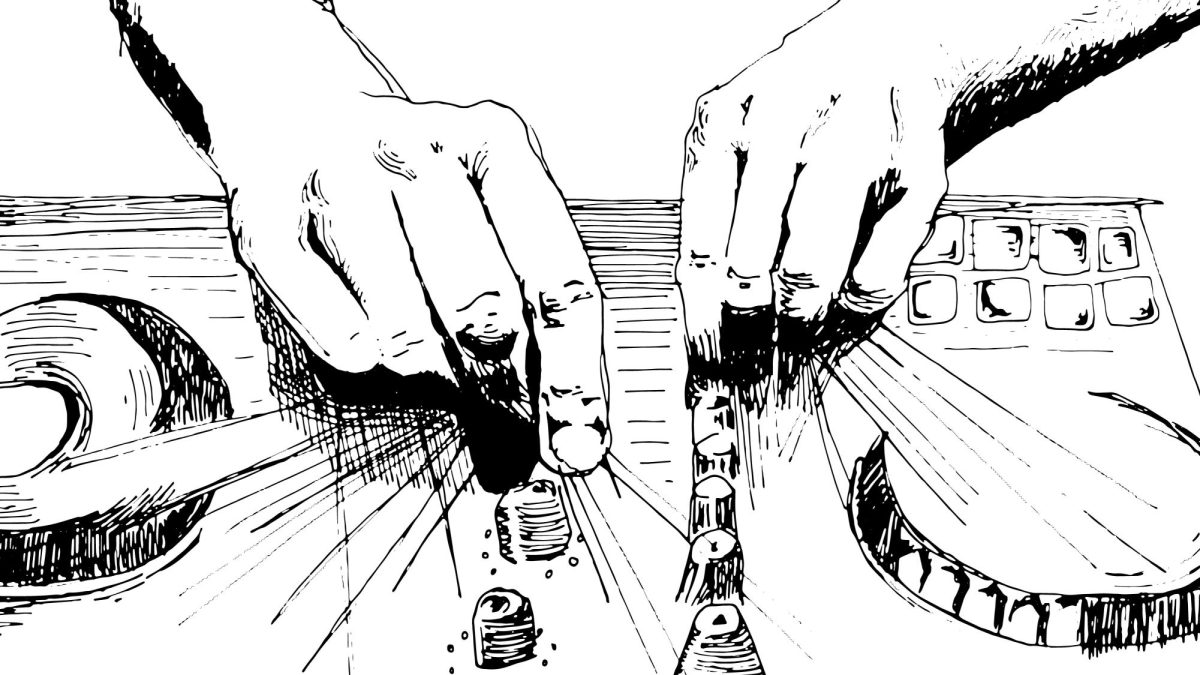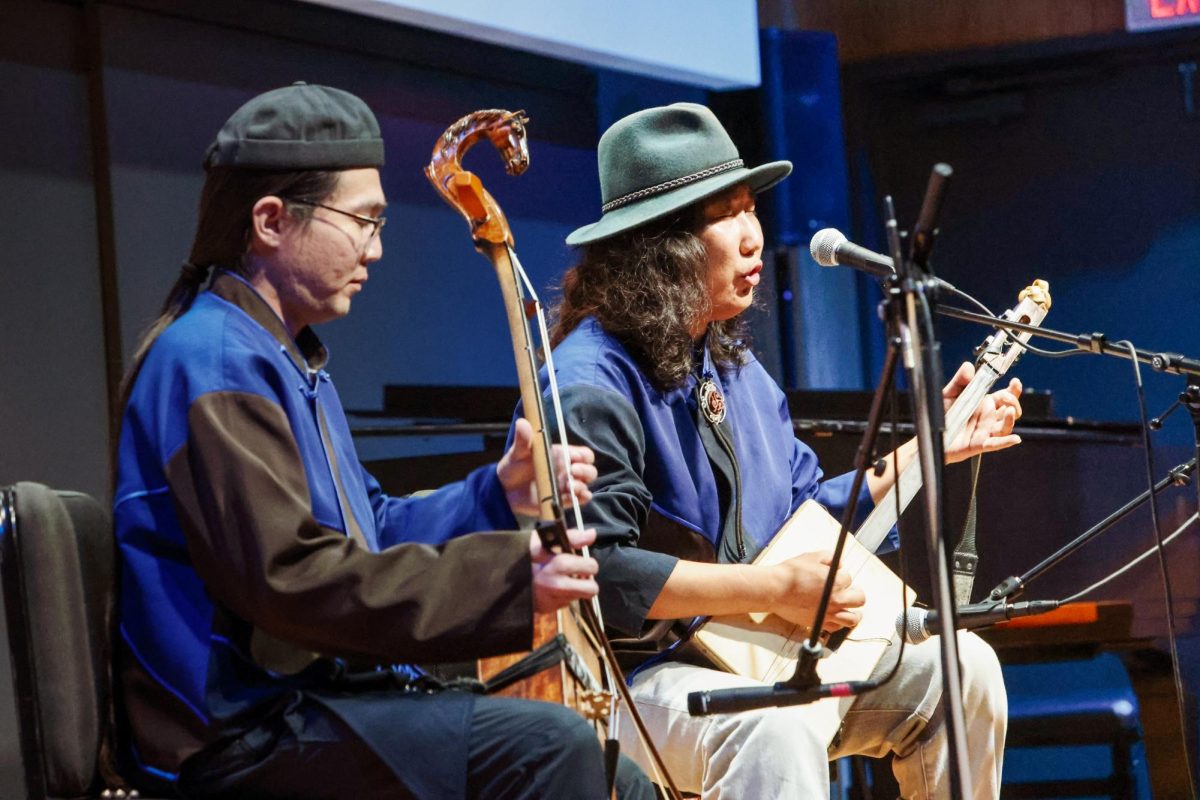
The ’62 Center Dance Studio was transformed into a nightclub last Friday when self-described South Asian “drag auntie” LaWhore Vagistan returned to the College to perform her show “Lessons in Drag.” Vagistan — the drag persona of Kareem Khubchandani, an associate professor of theatre, dance, and performance studies at Tufts — previously worked at the College as the assistant director of the Multicultural Center and queer life coordinator in 2007.
During her performance, Vagistan offered a transnational approach to drag that touched on themes of globalization, feminist theory, and Islamophobia. Part lecture, part lip-synch, and part audience engagement, the show has been performed across the nation and was brought to the College by the American studies and Asian American studies departments.
Assistant Professor of American Studies Kelly Chung, who helped bring Vagistan to the College, said she wanted to expose students to the ways institutional spaces can be re-envisioned as sites of queer play and potential. “LaWhore was invited not only to tap into the queer world-making potential, even in spaces like Williams — but also to illuminate concrete ways that racialized, gendered, and sexual projections may be retooled and reenacted by us,” she wrote in an email to the Record.
The show began with Vagistan strutting through the side door of the dance studio, making her grand appearance in a leopard print jumpsuit and bright yellow hair. Vagistan went on to discuss aspects of her book Ishtyle: Accenting Gay Indian Nightlife, explaining the experience of gay South Asian immigrants in queer nightlife in the United States.
“Nightlife is a place where a lot of these queer people have to struggle to make a place for themselves,” Vagistan said during the show. “They not just have to assimilate into the nation but into gay spaces.” As a result, Vagistan explained, many queer South Asians who participate in nightlife overwork themselves to fit into these spaces by shaving their nose hairs and going to the gym.
According to Vagistan, this feeds into the model minority myth — the idea that Asian Americans are pitted against people of other underrepresented groups and are expected to be extremely successful and hardworking.
“The place we see this most prominently — this obsession with just being perfect all the time and getting it right — is the spelling bee,” Vagistan said. “This is where we see immigrant trauma… It is exhausting, and tiring, and the most hilarious thing I have ever seen.” Vagistan proceeded to perform a lip-synch that combined popular songs by Fergie and Aretha Franklin with recordings of South Asian children competing at spelling bees.
Following this lip-synch, Vagistan discussed how assimilation is also practiced by queer South Asians who live on the Indian subcontinent and work in call centers where telemarketing calls are answered. “I have talked to a lot of queer call center workers who rehearse the way they speak and change their voice so they could talk to you and be like you,” Vagistan said. She went on to perform another lip-synch that incorporated clips of queer South Asians working at call centers into a mashup of the songs “Telephone” by Lady Gaga, “Hotline Bling” by Drake, and “Hello” by Adele.
Following this portion of the show, Vagistan changed into a new outfit — with short blonde hair and a bright red sari, a garment traditionally worn by women in South Asia. The show proceeded with Vagistan discussing the idea of the auntie — which she explained as an elderly, firm, gossipy fashionista — and the role aunties have played in her personal life and drag career. “Aunties have a reputation of scolding us and disciplining us,” she said. “My experience with my aunties is that they would fat shame me and compliment me at the same time.”
For this reason, Vagistan explained that she understands why aunties are often seen as a problem. “But I also think it’s important to recover a bit about aunties and understand how they give each other the gift of survival,” she said. Vagistan proceeded to ask audience members to name their favorite “auntie attribute,” to which people responded with “cheek squeezing,” “telling good stories,” and “feeding you in a non-forceful way.” She added that her personal favorite auntie attribute is participation in Zumba, a fitness program that involves cardio and Latin-inspired dance — which Vagistan invited several audience members to the stage to perform.
Vagistan followed the Zumba performance with a final costume change, making her final appearance in a long nightgown and curly red hair to discuss how drag can sometimes transcend ideas of gender. “It can also be about other aspects of our lives, including race and religion,” she said. Vagistan said that she leaned on this idea for a 2017 drag performance in response to then-President Donald Trump’s executive order banning people from several Muslim-majority countries from traveling to the United States, which she said addressed the ban through song and dance. Vagistan performed this piece on Islamophobia next.
Then, as a final point, she discussed how she wishes she could implement more auntie traditions and culture into her drag performances at nightclubs. “We South Asian drag queens are only legible through very few understandings of what Asian American gender can look like,” she said. “However, this doesn’t have to be a problem — the performance of identity can be used to other ends and to tell different stories.”
Audience member Megan Groomes ’24 — whom Vagistan recruited at the show’s outset as her assistant — said that she enjoyed getting to be a part of the performance. “I enjoyed seeing all of the behind-the-scenes of how she is able to have elaborate costumes while making everything feel so seamless,” she wrote in an email to the Record. “I was nervous at first, but the playful element of everything really made me glad I volunteered by the end.”
Chung added that Vagistan’s performance challenged the institutional pressure put on students to constantly be successful and polished. “Her embrace of failure, like when she embraced being ‘out of shape’ and being ‘furry,’ might inspire us to embrace failure ourselves,” Chung wrote.








